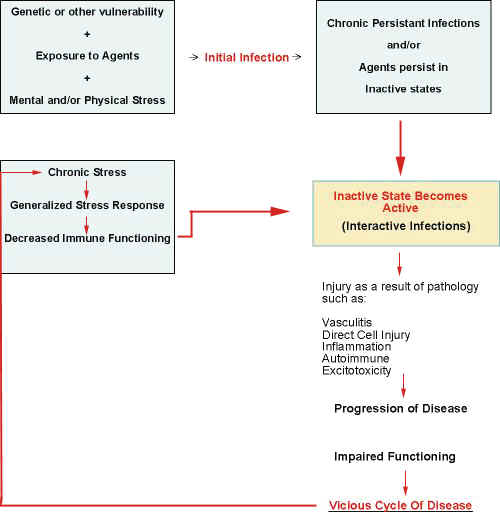
Infectious Disease and Mental Illness
A significant amount of disease and mental disease may have an infectious disease component to the pathological process. The evidence to support this is a combination of insights from theoretical biology (particularly Darwinian medicine), an expanding database of medical research and direct clinical observations.
In my clinical experience, the link between psychopathology and infectious disease has been an issue with Lyme disease, syphilis, babesiosis, ehrlichiosis, mycoplasma pneumonia, toxoplasmosis, borna virus, AIDS, CMV, herpes, strep and other unknown infectious agents.
The combination of chronic stress and chronic low-grade infectious disease is a frequently seen dynamic. Disease begins with vulnerability and an exposure to one or more stressors. The vulnerability may commonly include genetic and/or increased vulnerability as a result of chronic stress. As a result of these and other vulnerabilities, the microbe more easily penetrates the host's defenses and an initial infection may then occur. The course of the infection most relevant to psychiatry would be chronic, low-grade, persistent infections or the persistence of the infectious agent in the inactive state. At a later point in time, some triggering event(s) (i.e.: chronic stress or other infectious agents), may then cause the activation of the infectious agent(s) and the progression of the pathological process. Neural injury may occur by a variety of mechanisms, which include vasculitis, direct cell injury, inflammation, autoimmune mechanisms and excitotoxicity. This injury leads to a vicious cycle of disease resulting in dysfunction of associative and/or modulating centers. Injury to associative centers more commonly causes cognitive symptoms, while injury to modulating centers more commonly causes emotional and allocation of attention disorders. In some cases, the infection and injury may occur before birth.
In my collective database of patients demonstrating psychiatric symptoms in response to infectious disease, the majority of the cases has been infected by Lyme disease and quite often co-infected with other agents. Psychiatric syndromes caused by infectious disease in my database most commonly include depression, OCD, panic disorder, social phobias, variants of ADD, impulse control disorders, bi-polar disorders, eating disorders, dementia, various cognitive impairments, psychosis and a few cases of dissociative episodes. In the more obvious cases, symptoms are present with cognitive, neurological and physical signs. Laboratory tests are sometimes, but not always, able to confirm the diagnosis.
